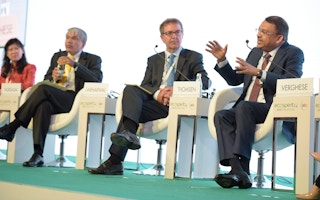As pressure mounts for business to be more responsible and contribute to social good, they can uncover new opportunities by pursuing productivity and collaborating with one another, said private sector leaders at an international conference on Monday.
Sunny Verghese, chief executive officer of agribusiness giant Olam, pointed out that humans have already crossed four of the nine planetary boundaries—theoretical limits on changes to the environment—and companies must learn to “do more with less”, or be as productive with fewer resources.
He was speaking at a panel discussion on how responsible business can deliver better opportunities at this year’s Ecosperity conference, which was organised by Singapore investment firm Temasek and held at the Ritz-Carlton in Singapore.
This year’s theme focused on how businesses can align their operations with the UN’s Sustainable Development Goals to bring about sustainable growth.
This is a key concern for agricultural firms such as Olam, given that there could be as many as 9.6 billion mouths to feed by 2050, according to UN projections.
“We will need to double food production on a crop basis and increase food production by 70 per cent in terms of calories produced,” Verghese said, framing this target as a “massive challenge” for the sector.
Industries should collaborate to pool available assets and capabilities in order to change the major production systems of the world, including food and agriculture, he commented. Olam is majority owned by Temasek and is considered the world’s biggest farmer, owning and managing 3.3 million hectares of land around the world.
“
Fifty per cent of India’s labour force produces only 11 per cent of our GDP. They’re not employed, they’re hanging out.
Manish Sabharwal, chairman and co-founder, TeamLease Services
Productivity was also a central concern for another speaker on the panel, human resources firm TeamLease Services’ chairman and co-founder, Manish Sabharwal.
He said that while the number of university graduates on the market are at an all-time high, there is a fundamental mismatch between what students are being trained for and what is needed in the market, and as a result, many menial positions in India are filled by degree holders.
Sabharwal said: “Poverty is about productivity, which is about education, employment and employability.”
Yet —”Fifty per cent of India’s labour force produces only 11 per cent of our GDP. They’re not employed, they’re hanging out.”
It was this mismatch in the economy that opened the opportunity for Sabharwal and his partners to start India’s first vocational university. Called TeamLease Skills University, the institute offers a skills-based education that is also flexible to students who may want to enter the workforce halfway through their studies or return later on. Located in Gujarat, the school was set up in 2014 through a public-private partnership.
Making power while the sun shines
Another firm that is tapping into potential business opportunities in sustainable development is Fluidic Energy, a maker of low-cost energy storage platforms. The product is most suitable for markets where the power grid is non-existent, unreliable or where renewables will become the future of electricity generation on a large scale.
Fluidic Energy therefore identified Asia, Latin America and sub-Saharan Africa as main markets for growth, and says the solution’s ability to create jobs locally would also be an important factor for customers and governments deciding whether to work with the company.
Dennis Thomsen, chief marketing officer of Fluidic Energy, said: “The challenge we threw our research and product development guys at that time was not just to develop the technology, but also do so in such a way that the supporting supply chains and ease of manufacturing makes it possible for us to operate literally anywhere in the world.”
The company has made inroads into Asia, having established a base in Indonesia in 2011, and recently received $20 million investment from equity fund Asia Climate Partners to expand renewable energy deployment in the region.
Asked how businesses can enable economic transformation in Asia, he commented: “From my perspective, you have to give people the opportunity for sustainable economic growth. Without access to affordable, reliable power, they don’t have that opportunity…things are not going to change.”
“We won’t be blackmailed”
While businesses have plenty of intrinsic motivation to pursue sustainability, they also face intense scrutiny and pressure from non-government organisations (NGOs) to plug gaps in their environmental and social performance.
During the question-and-answer portion of the panel discussion, Tan Yi Han, the co-founder of Singapore non-government organisation (NGO), People’s Movement to Stop Haze (PM Haze), asked if “tension” between NGOs and the private sector was necessary before companies would implement sustainable business practices.
Tan was referring to Olam’s recent promise to halt deforestation, peatland development and to root out labour abuses in its West African and Southeast Asian supply chains.
Verghese replied that while Olam believed in the importance of winning mainstream support, “we are not willing to be blackmailed by extreme, ideologically intransigent groups,” he said. “We will engage with them, but if we believe we are doing the right thing, we will stand our ground.”
The company had come under fire at the beginning of this year following the publication of a report by American NGO Mighty Earth that linked Olam’s activities to deforestation in Gabon and Southeast Asia, and alleged that the company was obfuscating the unsustainable agricultural practices of its suppliers.
Olam and Mighty in February agreed to collaborate on forest conservation and sustainable agriculture initiatives in Gabon and Southeast Asia.
In his response to PM Haze’s Tan, Verghese said that Olam had already has a code for its upstream suppliers and only develops plantations if the area in question meets boundary conditions. These include no development in high conservancy areas, peatland, high carbon stock areas, no burning to clear the land, passing the environmental sustainability impact assessment, and no exploitation.
Verghese added: “As Olam we will not do anything that’s not sustainable, but we will stand our ground if we’re doing the right thing.”





















